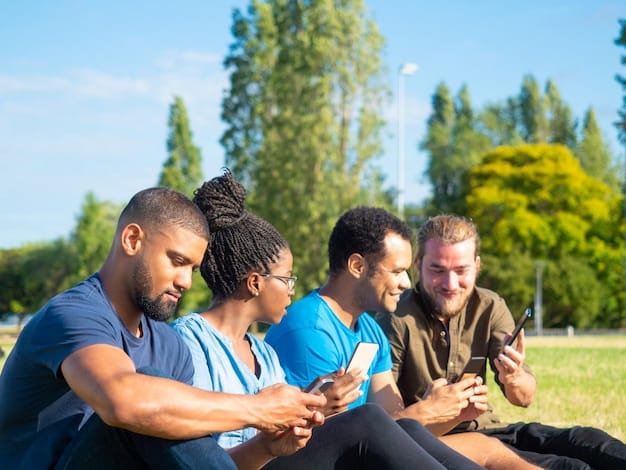How Social Media Shapes US Culture: A 3-Month Deep Dive

Anúncios
Social media’s influence on American cultural norms in the last three months has been significant, impacting areas such as political discourse, social activism, and consumer behavior, largely driven by trending topics and viral content.
The rapid evolution of social media continues to reshape the fabric of American society. But how has social media changed American cultural norms in the last 3 months? Let’s explore the key trends and shifts influencing our collective behavior and beliefs.
Anúncios
The Rise of Short-Form Video and its Cultural Impact
Short-form video content has exploded in popularity, influencing how Americans consume and share information. Platforms like TikTok and Instagram Reels have become cultural epicenters, driving trends and shaping online discourse. Understanding this shift is crucial to grasping contemporary American culture.
Trend Adoption Cycles
Social media accelerates the adoption of trends, often within weeks. This rapid dissemination influences everything from fashion choices to dietary habits.
Anúncios
Meme Culture and Virality
Memes have become a primary form of communication, reflecting and shaping cultural values. Viral content can quickly galvanize public opinion and shift perceptions.
- Increased Accessibility: Short-form video democratizes content creation, allowing anyone to participate in viral phenomena.
- Shorter Attention Spans: The constant barrage of short videos contributes to shorter attention spans, affecting how information is processed.
- Global Cultural Exchange: These platforms facilitate the exchange of cultural ideas globally through short-form engaging content.
The convergence of these factors results in a dynamic cultural landscape where trends evolve faster than ever. Social media not only reflects culture but actively shapes it, setting the stage for the next wave of viral sensations and social movements.

Political Discourse and Social Activism Online
Social media has become a crucial arena for political discourse and social activism. Hashtag campaigns and online movements have the power to influence public opinion and drive real-world change. Analyzing this impact reveals the complexities of modern American civic engagement.
Hashtag Activism: A Double-Edged Sword
While hashtags can raise awareness, they sometimes lack the depth needed for meaningful change, leading to performative activism.
Echo Chambers and Polarization
Algorithms often create echo chambers, reinforcing existing beliefs and contributing to political polarization within the US.
- Instant Mobilization: Social media enables quick mobilization for protests and advocacy efforts.
- Amplification of Marginalized Voices: Platforms provide opportunities for marginalized groups to amplify their messages and experiences.
- Misinformation and Disinformation: These platforms can easily spread false or misleading information, affecting public perception and decision-making.
Consequently, social media serves as both a powerful tool for democratic engagement and a potential source of division and misinformation. Navigating this landscape requires critical thinking and informed participation to ensure that online activism translates into meaningful societal improvement and responsible political discourse.
The Transformation of Consumer Behavior
Social media channels profoundly affect consumer choices and buying habits. Influencer marketing, targeted advertising, and social commerce fundamentally transformed how Americans discover and purchase products.
Influencer Culture and Brand Loyalty
Influencers’ endorsements can significantly affect consumer purchasing decisions, altering the conventional framework of brand loyalty.
Social Commerce and Instant Purchasing
The integration of e-commerce features into social platforms allows for on-the-spot purchases, blurring the lines between awareness and transaction.
American consumerism is increasingly swayed, sometimes to an excessive degree, by the narratives and promotions seen in their social media feeds, underscoring the need for consumers to cultivate digital media literacy and make more informed purchasing decisions.
Mental Health and Social Media Usage
Increased social media use has been tied to mental health problems, especially among younger individuals. Cyberbullying, social comparison, and the constant need for validation can negatively impact mental health.
The Pressure of Online Presentation
Curated online personas often contribute to feelings of inadequacy and anxiety in those constantly comparing themselves to what they see online.
- Increased Awareness: More discussion about mental health on social platforms destigmatizes seeking help.
- Support Networks: Individuals find support communities online that offer encouragement and understanding.
The impact of social media on mental health is complex, presenting both problems and possibilities. By understanding the risks and benefits, individuals can make educated choices about their social media usage, supporting their mental health and well-being in the digital world.

Privacy Concerns and Data Usage
American cultural norms are being reshaped by increased awareness about data privacy. Debates regarding the ethical use of personal data collected by social media platforms are becoming more common, leading to changes in how individuals and companies approach online privacy.
Data Collection Practices
The pervasive data collection practices and how these influence targeted advertising requires enhanced regulatory oversight and consumer awareness.
User Awareness and Control
Americans are becoming more vigilant about controlling their digital trail, indicating a cultural shift towards embracing enhanced online privacy and security practices. The empowerment of users through informed consent and data management tools is critical to fostering a digital atmosphere rooted in trust. This movement is not just about individual rights but also about ensuring that digital interactions are grounded in respect and ethical considerations.
The Evolution of Social Identity
Social media platforms have altered how individuals construct and express their identities. Online profiles offer a space for self-expression but also create challenges in authenticity and self-perception where the authenticity of representation and its impacts on self-perception are becoming matters of cultural discussions.
Online vs. Offline Identity
The gap that lies between one’s presented online persona and their real-life characteristics is widening highlighting identity fluidity.
Community Building and Identity Reinforcement
Online communities enable people to locate and connect with like-minded individuals, reinforcing particular identities and communal connections with shared beliefs. This has changed how Americans find niche groups and reinforce cultural norms.
Conclusion
In summary, social media continues to exert a profound influence on American cultural norms. From shaping political discourse to impacting consumer behavior and mental health, the effects are far-reaching and dynamic. As social media evolves, staying informed about these changes becomes crucial for navigating and understanding contemporary American culture.
Emoji & Key Point
Brief Description
📌 Short-Form Video Rise
Rapid trend adoption and meme culture dominate digital spaces.
📣 Online Activism
Social media mobilizes protests, but echoes polarization.
🛒 Consumer Transformation
Influencers sway purchasing; e-commerce blurs lines.
🤕 Mental Health Impact
Pressure online can cause anxiety and inadequacy feelings.
Are social media algorithms creating filter bubbles?
▼
Yes, algorithms often promote content based on users’ previous engagement patterns, reinforcing existing beliefs and contributing to filter bubbles or echo chambers.
How has influencer culture transformed consumer habits in America?
▼
Influencer marketing has shifted traditional brand loyalty, with consumers now heavily influenced by endorsements and recommendations from social media figures, impacting purchasing decisions.
What are the potential benefits and downsides of online activism via platforms like Twitter?
▼
Online activism can quickly raise awareness and mobilize support for social causes, but it can also be susceptible to misinformation, lack depth, and promote performative activism.
How is social media affecting mental health among young Americans ?
▼
Social media use is linked to increased anxiety and depression, particularly among younger users, as the constant comparison to curated online personas can foster feelings of inadequacy.
What role do memes play in shaping American cultural narratives?
▼
Memes serve as a primary form of communication, reflecting and shaping cultural values. Their virality can quickly galvanize public opinion and shift perceptions on various issues.
Conclusion
In conclusion, social media’s impact on American cultural norms over the last three months has been profound. From shifting political discourse to transforming consumer behavior and influencing mental health, social media plays a pivotal, and sometimes complex, role in shaping the contemporary American landscape.
Read more content





